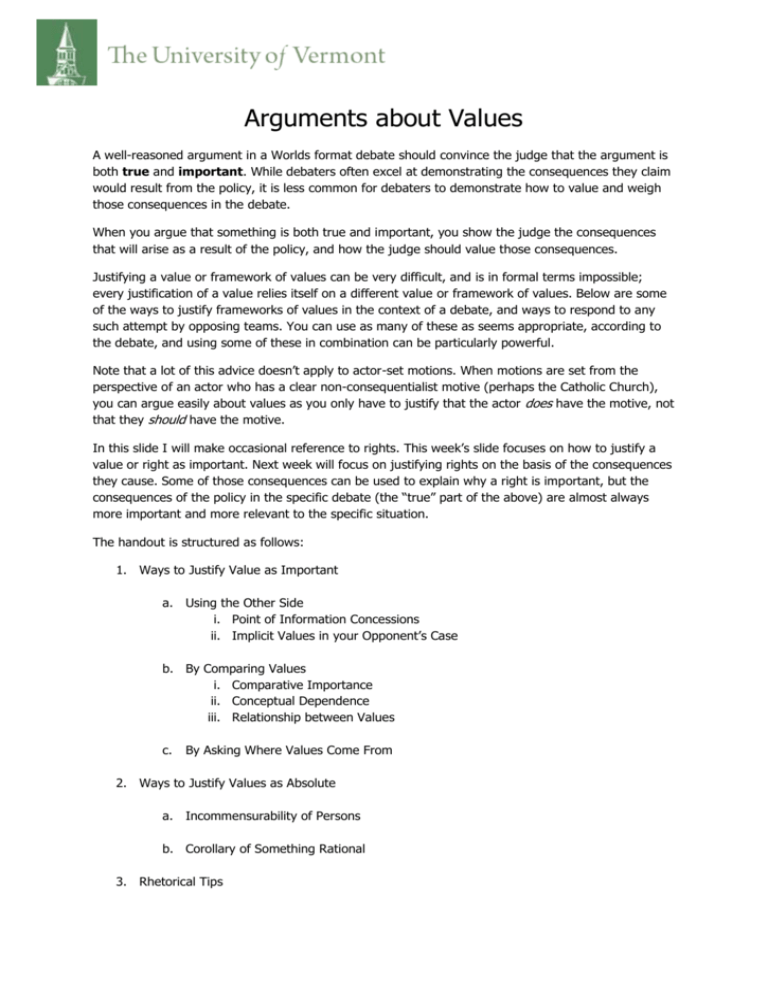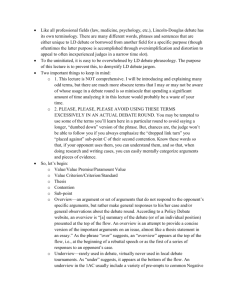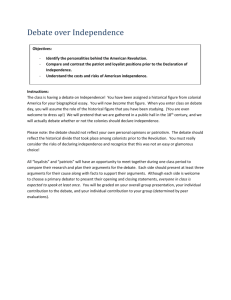Arguments about Values
advertisement

Arguments about Values A well-reasoned argument in a Worlds format debate should convince the judge that the argument is both true and important. While debaters often excel at demonstrating the consequences they claim would result from the policy, it is less common for debaters to demonstrate how to value and weigh those consequences in the debate. When you argue that something is both true and important, you show the judge the consequences that will arise as a result of the policy, and how the judge should value those consequences. Justifying a value or framework of values can be very difficult, and is in formal terms impossible; every justification of a value relies itself on a different value or framework of values. Below are some of the ways to justify frameworks of values in the context of a debate, and ways to respond to any such attempt by opposing teams. You can use as many of these as seems appropriate, according to the debate, and using some of these in combination can be particularly powerful. Note that a lot of this advice doesn’t apply to actor-set motions. When motions are set from the perspective of an actor who has a clear non-consequentialist motive (perhaps the Catholic Church), you can argue easily about values as you only have to justify that the actor does have the motive, not that they should have the motive. In this slide I will make occasional reference to rights. This week’s slide focuses on how to justify a value or right as important. Next week will focus on justifying rights on the basis of the consequences they cause. Some of those consequences can be used to explain why a right is important, but the consequences of the policy in the specific debate (the “true” part of the above) are almost always more important and more relevant to the specific situation. The handout is structured as follows: 1. Ways to Justify Value as Important a. Using the Other Side i. Point of Information Concessions ii. Implicit Values in your Opponent’s Case b. By Comparing Values i. Comparative Importance ii. Conceptual Dependence iii. Relationship between Values c. By Asking Where Values Come From 2. Ways to Justify Values as Absolute a. Incommensurability of Persons b. Corollary of Something Rational 3. Rhetorical Tips 1. Ways to Justify Value as Important a. Using the Other Side This section discusses ways you can use the arguments or concessions of your opponents to justify your values. i. Point of Information Concessions It is often possible to have your value endorsed by the opposing teams. This can be done effectively by offering them a Point of Information about the specific value. Ideally, they would agree that the value you put to them is the “most important thing”. While such an endorsement is rare, even getting the opposing side to recognise the importance of the value is of significant rhetorical value. You are then able to associate your opponents with your argument, for example by saying “It is our case, and [Proposition/Opposition] agreed when asked in a point of information, that Value X is important.” Sometimes this can be done directly and simply. You may want to establish the value of some nonconsequentialist consideration, such as proportionality, justice or a certain right. You can then ask your opponent a question (ideally closely related to the debate) asking them to either make a fullthroated defence of utilitarianism, or accept some other value. For example, in a debate about criminal justice you may wish to ask a PoI about whether your opponent supports imprisoning innocent people to prevent riots. They must then either accept this (something that feels counterintuitive), or admit that some other values exist. The PoI asked should be directed closely to the subject matter of the debate so that a team feels compelled to give an answer. For example, if a team in a debate about international intervention makes a claim about sovereignty, an opposing team may ask “Should a nation be considered sovereign to commit genocide?” Responding “no” is a concession that intervention can be justified on consequentialist grounds, and then allows the team offering the point of information to use consequences to justify an intervention, bypassing most sovereignty claims. This may also be done both indirectly; consider the motion “THW Make it Illegal to Incite Others to Boycott Elections”. Opposition may argue that if an individual can boycott an election, it skews the democratic process to not allow them to action that right by campaigning for others to do the same. However, this relies on the premise that individuals should be allowed to boycott elections, which may be difficult to demonstrate. However, if Proposition are asked to endorse boycotting elections, they are likely to do so – especially as the motion seems to suggest that boycotting elections is a legitimate political position. Clearly, a sensible Government would try to avoid giving a clear answer on this. It is therefore best to word the PoI as “Do you recognise that individuals have a right to boycott elections, or would you ban that too?” The binary then presented requires the speaker to either endorse your premise, or to adopt a position that is different to the status quo and possibly contrary to a judge’s intuition. How to avoid; always be careful when responding to PoIs. If asked to recognise a value, be sure to downplay its importance if you do not think your case advances that value as well as your opponents case does. If you are unsure what the PoI refers to, you can recognise a value as important, but be sure to explain that it is only one value and other considerations may be of greater importance. If running a purely utilitarian case, and you are asked whether you support something that feels intuitively unsatisfactory but also sounds like a utilitarian would support it... think again. Remember that a utilitarian can take into account a broad range of consequences; for example, in the criminal justice example, if asked whether you support imprisoning the innocent to prevent riots, you can say you do not ask the consequence of doing so undermines faith in the system of justice, and offends people’s sense (however unjustifiable) of fair play. This latter claim is especially powerful as you don’t have to justify that sense of fair play – just observe that people have it. ii. Implicit Values in your Opponent’s Case Sometimes a team in their arguments or (more likely) their model may implicitly recognise your value or value framework, allowing you to show that they implicitly recognise its importance. This is most likely in Opening Government, where the limits placed on the policy may be useful indications of values that Opening Government support. You can then explain why the limitations placed on the policy reveal those values, and explain how your arguments fit into those values. For example, on the motion “THW Conscript All Citizens into Military Service in time of War”, if OG make an exception for those whose religious or philosophical convictions make them opposed to fighting, this can be used. Rather than having to prove in principle that there is something problematic about requiring individuals to be forced to fight for causes they find objectionable, Opposition can merely argue that the reasons which inspire OG to make their concession are the same as the reasons for which you oppose the policy. How to avoid; as an Opening Government team, be careful to not place too many limitations on your model that cannot be justified using the same moral framework as you use to justify the policy. The same should be true (and almost always is) for your argumentation. b. By Comparing Values This section discusses how to compare the value you are arguing for is more important than the value your opponents are advocating. i. Comparative Importance There are various ways of claiming that one value or right, preferably the one that best serves your case, is more important than another value or right. For example: a. The value is extremely important to those who need it. For example, you may claim that religious freedom is very important as religion can be wholly constitutive of your identity, your actions and your life goals. In another example, you may claim that freedom of speech is vital because it maintains a system where the best ideas prosper. You should compare this value to your opponents by attempting to minimise theirs. b. The state should prioritise This can be argued multiple ways. You may claim that certain values or rights are disproportionately important to vulnerable groups, and therefore the state should ensure that those groups are adequately protected. You can also claim that the state is more capable of protecting one value than another, and so should focus on that one, leaving the other one to private citizens. You may finally claim that the state should protect people from involuntary harm over voluntary harm, as a person cannot avert involuntary harm themselves. c. Moral structural reasons. Again, this encapsulates many ideas. You can argue that acts are more morally significant than omissions, as a failure to do something may merely be the same as though the state never existed and so can’t really be said to be worthy of particular blame, whereas actively making a life worse puts the state in a form of moral debit. Another powerful example of this category is the concept of facilitative rights – you can argue that a right or value is more worthy of protection because other rights or values are facilitated or allowed by it. ii. Conceptual Dependence In some situations it can be argued that one value is dependent on another. For example, if we are required to compare the values of liberty and security, we can argue that liberty should be more important, as the only reason we aspire towards security is such that we are able to preserve our liberty. Security can then be described as meaningless if it fails, in fact, to protect our liberty. Alternatively, if arguing that security should trump liberty, we can claim that security is a necessary prerequisite for liberty, and that it cannot exist without security. While this analysis can be developed to some extent, it is often somewhat simplistic. However, by devoting a significant portion of your speech to underline which value or right is more significantly facilitative of the other, a judge is likely to feel you have made some sort of contribution. How to respond; firstly, bear in mind that the upholding of values is rarely a binary. We are typically not trading all our security for all our liberty (or vice versa), but making a small and discreet change to one value that may have a small and discreet effect on another value. This analysis can be best used to justify the value that is not security, in the above example. Consider a motion advocating torture, where a Government team argued that if we cannot defend ourselves, we cannot meaningfully uphold and advance our values. You can respond to this by claiming firstly that torture is likely to only marginally improve our ability to defend ourselves. From this, we can see that while some harm may be done to the state by refusing to engage in torture (perhaps a few extra attacks on troops or by terrorists), this does not destroy the country as a value-upholding entity. Furthermore, it can be argued that sacrificing a value now (e.g. liberty) to defend it later is a nonsense, as a nation has demonstrated a willingness to sacrifice that value in extreme circumstances and thereby indicated a willingness to do so in the future. Values should describe broad moral frameworks that prescribe action in all circumstances, not moral stances in relation to particular circumstances. Otherwise, we can no longer claim that these values adequately describe our motives. This may result in needing to make appeals to absolute values; see below for a discussion on this. iii. Relationship between Values Considering the nature of the relationship between either values or the people you are claiming those values should apply to can reveal something about their comparative importance. For example, consider a motion discussing whether abortion should be allowed. When arguing for abortion rights, a team can consider the relationship between a mother and an unborn foetus. The foetus is an agent foreign to the mother, yet which compromises the mother’s bodily integrity. That relationship can therefore be described as one of assault. As such it should be legitimate for the mother to exercise self defence (although be aware of the responses that may focus on consent undermining the assault comparison). Another example of the above technique is in a hypothetical debate about a religion having the right to oppress women in some way (for example, THW Allow Polygamous Marriages in Religious Communities where it is deemed acceptable – or something set in a non-Western context). It can be observed in Opposition that the right that religion asks for is a right to harm an individual to satisfy their own desires. By comparison, the right the women seek (or perhaps the rights women would seek absent some form of coercion and in the presence of better information about the possibility of Western rights) is to be left alone. There is necessarily a limitation on rights; but we must choose between a relationship of active harm and one of passivity. How to respond: You may wish to observe that the above analysis labels rights in some way according to their interaction. You can observe that rights, and the violation of someone’s rights that must occur in each of the above decisions, will always harm another irrespective of their relationship. You can then focus the discussion on the extent of the harm caused to each person affected. c. By Asking Where Values Come From Asking where a value or right can be used to show why a certain value is recognised and upheld. It can then be argued that your side upholds the underlying reason for the value or right better than the other side. For example, consider a debate where we are arguing that a religious practice that oppresses women should not be allowed. When responding to arguments about religious freedom, we can ask why we consider religious freedom to be important. We could argue that religious freedom is normally upheld as it forms a key part of an individual’s identity. We can then argue that the practice being discussed in the debate is one that is coercive of a person’s identity by imposing gender roles upon them. We therefore demonstrate that the root value – that of upholding freedom of identity – is best advanced with banning the practice. Note that even if your opponent claims that they better uphold freedom of identity, their position has been weakened by the fact that they are now fighting on your terms, and have conceded that they missed the point when arguing for religious freedom rather than freedom of identity. How to respond: Sometimes, you can take on your opponent on the grounds they choose. If so, do it. If you cannot, reject their grounds. You can claim that the right derives from some other source – or multiple sources – and so the underlying reason analysed by your opponent is flawed. For example, you can claim that religious freedoms are granted because we cannot verify whether the views they espouse are true or false, and so leave the determination to individuals. 2. Ways to Justify Values as Absolute This section discusses claims about absolute values. Firstly, note that justifying a value as an absolute (for example, pacifism) is a very difficult thing to do. Only do it if you feel the motion absolutely requires it or you are certain it’s the optimum line of attack in the debate. Secondly, if you are going to run something as an absolute value, don’t compromise yourself by doing it half-heartedly. Make all your non-consequentialist arguments together. If you want to additionally make consequentialist arguments, explicitly state that you are arguing them as an alternative, by saying “This policy is morally impermissible. However, even if it was morally permissible, it would still create more harms than benefits.” a. The incommensurability of persons It can be effective to argue that the experiences of different people cannot be traded off against each other effectively to make up some grand sum of utility. We cannot compensate the person harmed by a policy where others gain, especially if it involves their death. There is no great world organism that experiences the benefits and harms of the action. Put simply, if one person is subject to torture, that experience is the same whether he saves a million lives or if he saves no lives. How to respond: This argument only simply states that some are harmed more than others; it gives no way to weigh it. However, used in conjunction with ideas about acts and omissions, vulnerability and others, it can be made to sound important. b. Corollary of Something Rational It can also be argued that a particular policy is something we must or must not do as a corollary of something we routinely do. We can then claim that we must do the policy or jeopardise something much larger than the content of the debate. Consider again “THW make it illegal to incite others to boycott elections”. We can argue that democracy is an imposition on our freedom, and therefore must be able to accommodate all views to be a justifiable imposition (note here that any significant restriction on candidates at elections is normally not considered properly democratic). Argue that if the policy is passed, democracy itself becomes illegitimate as it fails to recognise those whose views are that you should boycott the election (anarchists, perhaps). How to respond: By attacking the link between the argument and the larger thing that is jeopardised. We can observe that democracy doesn’t really represent all possible views as that is essentially impossible. Instead, claim that it is good at representing most views, while getting good results. Argue that the larger consequence does not flow from the action taken in the policy. 3. Rhetorical Tips As discussed above, making claims about value can be difficult. In such situations, using rhetoric to convince the judge that you’ve done it well becomes more important. This can be done in a variety of ways that you will be familiar with. Some specific tips are as follows. Firstly, point to other places where the value is recognised. A wide range of examples from a wide context where the value is recognised can be very powerful. Use things like specific laws and common practices, constitutional protections, and protections in the European Convention on Human Rights (or common to other international treaties). Secondly, use paradoxes to access the intuitions of the judge. Point out the logical consequences of your opponents arguments where they sound intuitively illogical – particularly if they’ve conceded that they would support those outcomes in their speeches without adequate justification (such as if they accept that we can imprison the innocent to prevent riots in the example above). Point out any ways that their arguments might result in paradoxes. Do this in such a way as to subtly suggest that their position, endorsing as it does something the judge may be intuitively uncomfortable with, should also be considered counter-intuitive. Thirdly, link the specific value to an identity claim. You can make the claim that a government, as an imposition on your liberty, is also a representation of you as a person. You can thereby claim that any government action represents you as a person, and should therefore possess a reasonable set of values that the citizenship can identify with. Point to the ubiquity of the “not in my name” slogan when protesting things to support this claim. Lastly, don’t be afraid to appeal to emotion. When your opponent’s brand of pure utilitarianism seems cold-hearted and calculating, you can make an impassioned appeal to a base sense of dignity and humanity that cannot be captured in some utility calculation (you can also claim that such calculation is impossible). Using this as a reason for basic rights for all can be an effective way to emotionally convince those of many political persuasions to support your position.







